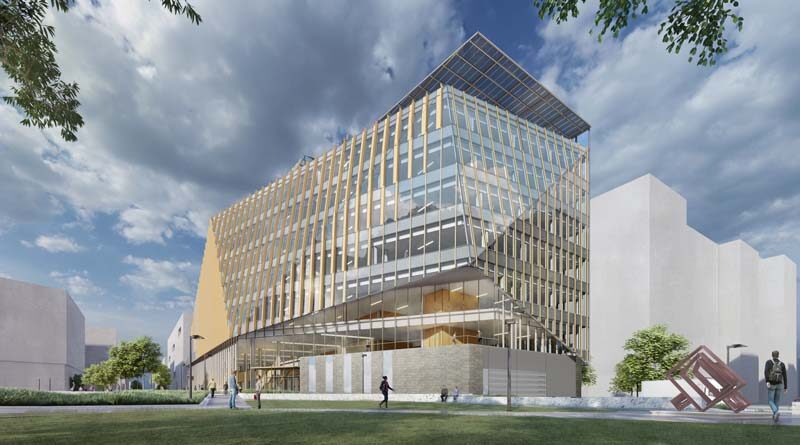Innovative New Virginia Tech Venue to Showcase Sustainability
ALEXANDRIA, Va.—The first academic building planned for Virginia Tech’s Innovation Campus earned rave reviews—and unanimous approval—on Oct. 17 from the Alexandria City Council for its architectural design and environmental sustainability features.
The Academic 1 building, designed by SmithGroup, features a gem-shape design centered on the principles of sustainability, health and wellness, green and social spaces, accessibility, connectivity, flexibility, and integrated technology. It has been designed to achieve LEED Silver certification from the USGBC.
“I love it. It’s absolutely the kind of thing we’d like to see there on that campus,” Councilwoman Redella “Del” Pepper said. “It’s really extraordinary.”
The Innovation Campus will make its home on 3.5 acres in the 19-acre first phase of a new mixed-use development and innovation district in North Potomac Yard that JBG SMITH is developing near the future Potomac Yard Metrorail Station.
“This is a large milestone and another step forward in welcoming Virginia Tech and continuing the development,” said Councilman Canek Aguirre. “This building just puts a smile on my face. I’m ready to see some shovels in the dirt.”
Mayor Justin Wilson noted the context of Virginia Tech building its Innovation Campus at Potomac Yard, a former industrial rail site that was an economic engine for the city in an earlier generation.
After years of planning and work, “we are making this the economic engine for the city for the next generation,” he said.
Moments later, the city council voted 7-0 in support of a development special use permit that clears the way for construction of the 11-story, 300,000 square-foot structure to start next summer in North Potomac Yard. The university expects to welcome students, faculty, and staff into the completed building in fall 2024. Plans call for two other buildings, measuring about 150,000 square feet each, to be built as the campus grows.
When completed, the Academic 1 building will provide instruction, research, office, and support spaces for graduate-level programs in computer science and computer engineering, as well as select other programs. Experiential learning environments within this building will be designed to enhance the Virginia Tech experience including flexible multi-purpose areas, research and testing labs, and maker spaces.
SmithGroup utilized computational and generative design techniques to inform the building’s unique geometry. The form was sculpted to capture the sun’s light and energy to maximize photovoltaic power generation. The building will include a space frame to allow for a rooftop solar array, while plans incorporate photovoltaics directly into the glazing system throughout the facade.
At Saturday’s hearing, the city council also approved development special use permits for six buildings JBG SMITH will develop in phase one of the North Potomac Yard redevelopment. Those buildings will offer a mix of office, retail, and residential space and include an “Innovation Building” adjacent to the Virginia Tech campus.
Mayor Wilson praised the university and JBG SMITH for their willingness to work with the city to create a unique project that “plows new ground” for environmental sustainability and features innovative design.
“This is not the same old, same old. I really appreciate the fact that we are stepping up on the architecture side,” he said. “This would not have happened without some partners who were willing to join us in pushing the envelope. I really appreciate both Virginia Tech as well as JBG [SMITH] for stepping up and saying we’re willing to help the city meet some of these goals. We can approve master plan after master plan. Unless you have a willing partner, who is ready to make it a reality it’s not going to happen.”
Brandy Salmon, managing director of the Innovation Campus, also lauded the collaboration between Virginia Tech, JBG SMITH, and the City of Alexandria.
“It’s hard to overstate the work — so much great thinking, community outreach, negotiating, and compromising — that has been done to get us to this point,” she said. “It’s all worth it — because together we have created the framework to build something special from the ground up — a vibrant innovation district anchored by a new Virginia Tech campus where our faculty, students, and industry partners will come together.”
Virginia Tech Innovation Campus Vice President and Executive Director Lance Collins said the council’s approval builds on momentum that has continued despite the challenges created by the COVID-19 pandemic.
“This is another clear signal that the innovation district momentum is building. We aren’t waiting to make an impact — that’s why we launched our inaugural class of students this year, hired a new chief operations officer, and are actively recruiting faculty and designing new programs,” he said. “Starting construction of the first academic building will be an exciting milestone and a visible reminder to the community of Virginia Tech’s commitment to the City of Alexandria.”
Through the state’s public procurement process, Virginia Tech has secured a pre-construction agreement with Whiting-Turner; a construction contract will be executed next year. The total project budget for Academic 1 is $275 million.

